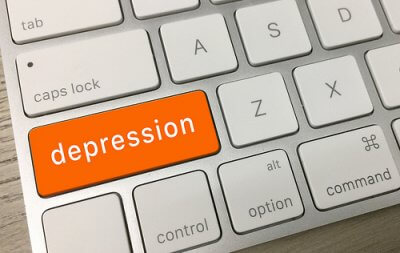What To Do If You Feel Depressed

By: Bev Sykes
by Andrea M. Darcy
Depression can show up in different ways for different people.
Walking depression can mean you carry on but feel numb. Major depression can see you find it hard to leave the house at all.
So what to do if you feel depressed? Regardless of how your depression looks, there are some tactics that are always helpful.
First Things First – Is It Depression?
If you haven’t been depressed before, it’s important to be sure that your low moods are not a symptom of a physical issue such as taking a new medication, or a thyroid problem. So consider a health check with your GP.
Feel low, but under a lot of pressure and know what is making you feel overwhelmed? It might be stress. Stress has an exact cause, and practical choices to deal with its trigger can help. Depression, on the other hand, can be made worse by trying to take practical action, because it causes illogical choices.
[Not sure if you are stressed or depressed? Why not try our free quiz, “Stressed, Depressed, or Both?” ]

By: Mike Lawrence
If you know why you feel low, but aren’t under stress, you might just be feeling sad. Read our article on “Sadness vs Depression” for more on the difference.
So then what are the symptoms of depression? Read our free “Guide to Depression“.
WHAT TO DO IF YOU FEEL DEPRESSED – 7 TIPS
What can help if you feel depressed?
1. Steer clear of alcohol and drugs.
It can seem a good solution at the time – to get ‘off your head’ so that you’ll feel better.
But substance abuse always backfires when it comes to mood management. Drugs and alcohol are actually depressants, meaning you’ll feel worse the next day. And if you are already depressed, you are more prone to do or say things you’ll regret when high or drunk. This, too, can leave you feeling worse.
[Don’t believe alcohol can be a bad idea? Read our article, “Are You Drinking Yourself Sad?“.]
2. Seek a positive distraction instead.

By: Wenjay Tew
A positive distraction looks like exercise, the company of a loved one, watching an inspiring documentary, or taking a few extra shifts at work to get you out the house.
It can help to identify your positive distractions that work for you when you are not depressed so you know to reach for them when you are.
3. Go for a walk. Now.
There is a story that goes around about a therapist who had a client in her office. He said he wanted to kill himself, and she agreed that was fine if he walked around the block ten times then came back. He obeyed, and when he got back he no longer wanted to.
Exercise has now been proven to help our moods.
Of course when we are really depressed, getting the energy together to even put on some fitness clothes and get out the door can feel overwhelming.
Read our article on “How to Exercise More Even if you are Depressed” for tips on how to overcome the mood hurdle.
You might want to consider getting out in nature for your walk, even if it’s just your local park. It has such a powerful affect on our wellbeing that a new branch of psychology, ecopsychology, focuses on just this.
4. Use a safe tool to process your emotions.
Even better than distraction is to process the repressed feelings behind your depression. Therapy is of course idea for this.
But self-help tools are a useful start. “Free journalling” can be effective. Promise yourself to rip up the pages after, then write down every single wild and crazy thought that comes out. Don’t judge yourself, just get it out. If you feel big emotions rise, it can feel good to punch some pillows or a mattress (be safe here).
Mindfulness is another good technique here. Sitting down for at least ten minutes and fully experiencing instead of running from how you feel can be quite the experience. With enough practise you will notice emotions seem to move through you. You might feel rage then end up crying or even laughing. Read our free Guide to Mindfulness to get started.
5. Steer clear of the wrong people.
Maybe you know someone very exciting and distracting, or there is someone you have casual sex with, and you find yourself reaching for the phone.
Keep this in mind- when we are depressed we have a skewered perspective and we are fragile. We say things we don’t mean, and are more susceptible to peer pressure. If it helps, think of it as being sick. Would you really want to be around that person if you had the flu? Then don’t be around them when you are depressed.
6. But DO seek connection.

By: Wendel Fisher
Depression leaves us lost in a fog and trapped in worst case scenario thoughts. Connecting with others is one of the best things for seeking enough of a space in the fog to question those thoughts.
Don’t let fear of letting people know you are depressed stop you from reaching out to others. It’s actually human contact that is important here, not what you talk about. You don’t have to share it if you aren’t ready to. Sometimes a phone chat about everyday things can help, connecting us back to normal life and briefly letting us be outside our own thoughts. Sometimes something as small as smiling to a stranger can help. Just get out and connect in any way you can manage.
7. Find proper support.
If your depression does not lift after several weeks, or if you are not new to depression but it has become a cycle, it is really, really important to get support.
It might be a good friend or family member you feel safe sharing your issues with at first.
But in the long term a counsellor or therapist is advised. They create a safe, impartial environment to get to the root of your mood swings, and to learn to change the behaviours that are causing your depression.
Harley Therapy connects you with psychotherapists and counselling psychologists in central London who can help you with your depression. Or use our new platform to contact therapists across the UK.
Still have a question about what to do if you feel depressed? Post in our public comment box below.





I liked how you said that a depression therapist provides a safe, impartial environment to help with mood changes, and to change the behaviors that cause depression. One of my friends had an anxiety attack a few days ago. He has found comfort talking to us, but it seems that he should see a professional for further help.
Yes, that would be advisable.
I love that you talked about seeking professional help if your depression doesn’t leave in a few weeks. Someone recently told me that they wished they would have reached out sooner for help when they were depressed. I can see how it would be hard to get help when you need it.
Hi Elisabeth, yes always good to reach out sooner over later.